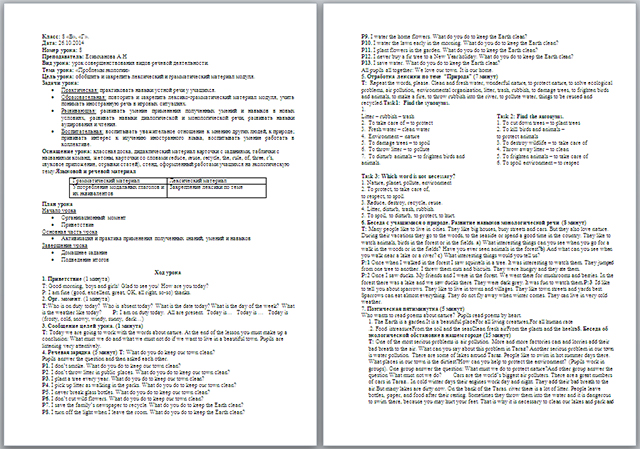Цель урока: обобщить и закрепить лексический и грамматический материал модуля.
Задачи урока:
· Практическая: практиковать навыки устной речи у учащихся.
· Образовательная: повторить и закрепить лексико-грамматический материал модуля, учить понимать иностранную речь в игровых ситуациях.
· Развивающая: развивать умение применения полученных умений и навыков в новых условиях, развивать навыки диалогической и монологической речи, развивать навыки аудирования и чтения.
· Воспитательная: воспитывать уважительное отношение к мнению других людей, к природе; прививать интерес к изучению иностранного языка, воспитывать умение работать в коллективе.
Ход урока
1. Приветствие (1 минута)
T: Good morning, boys and girls! Glad to see you! How are you today?
P: I am fine (good, excellent, great, OK, all right, so-so) thanks.
2. Орг. момент. (1 минута)
T:Who is on duty today? Who is absent today? What is the date today? What is the day of the week? What is the weather like today? P: I am on duty today. All are present. Today is… Today is … Today is (frosty, cold, snowy, windy, sunny, dark…)

3. Сообщение целей урока. (1 минута)
T: Today we are going to work with the words about nature. At the end of the lesson you must make up a conclusion: What must we do and what we must not do if we want to live in a beautiful town. Pupils are listening very attentively.
4. Речевая зарядка (5 минут) T: What do you do keep our town clean?
Pupils answer the question and then asked each other.
P1. I don’t smoke. What do you do to keep our town clean?
P2. I don’t throw litter in public places. What do you do to keep our town clean?
P3. I plant a tree every year. What do you do to keep our town clean?
P4. I pick up litter as walking in the parks. What do you do to keep our town clean?
P5. I never break glass bottles. What do you do to keep our town clean?
P6. I don’t cut wild flowers. What do you do to keep our town clean?
P7. I save the family’s newspaper to recycle. What do you do to keep the Earth clean?
P8. I turn off the light when I leave the room. What do you do to keep the Earth clean?
P9. I water the home flowers. What do you do to keep the Earth clean?
P10. I water the lawn early in the morning. What do you do to keep the Earth clean?
P11. I plant flowers in the garden. What do you do to keep the Earth clean?
P12. I never buy a fir tree to a New Year holiday. What do you do to keep the Earth clean?
P13. I save water. What do you do to keep the Earth clean?
All pupils all together: We love our town. It is our home.
5. Отработка лексики по теме “Природа” (7 минут)
T: Repeat the words, please. Clean and fresh water, wonderful nature, to protect nature, to solve ecological problems, air pollution, environmental organization, litter, trash, rubbish, to damage trees, to frighten birds and animals, to make a fire, to throw rubbish into the river, to pollute water, things to be reused and recycled. Task1: Find the synonyms.
Litter – rubbish – trash
2. To take care of – to protect
3. Fresh water – clean water
4. Environment – nature
5. To damage trees – to spoil
6. To throw litter – to pollute
7. To disturb animals – to frighten birds and animals.
Task 2: Find the antonyms.
1. To cut down trees – to plant trees
2. To kill birds and animals –
to protect animals
3. To destroy wildlife – to take care of
4. Throw away litter – to clean
5. To frighten animals – to take care of
6. To spoil environment – to respect
Task 3: Which word is not necessary?
1. Nature, planet, pollute, environment
2. To protect, to take care of,
to respect, to spoil.
3. Reduce, destroy, recycle, reuse.
4. Litter, disturb, trash, rubbish.
5. To spoil, to disturb, to protect, to hurt.
6. Беседа с учащимися о природе. Развитие навыков монологической речи (8 минут)
T: Many people like to live in cities. They like big houses, busy streets and cars. But they also love nature. During their vacations they go to the woods, to the seaside or spend a good time in the country. They like to watch animals, birds in the forest or in the fields. a) What interesting things can you see when you go for a walk in the woods or in the fields? Have you ever seen animals in the forest? b) And what can you see when you walk near a lake or a river? c) What interesting things would you tell us?
P:1 Once when I walked in the forest I saw squirrels in a tree. It was interesting to watch them. They jumped from one tree to another. I threw them nuts and biscuits. They were hungry and they ate them.
P:2 Once I saw ducks. My friends and I were in the forest. Wе went there for mushrooms and berries. In the forest there was a lake and we saw ducks there. They were dark grey. It was fun to watch them. P:3 I'd like to tell you about sparrows. They like to live in towns and villages. They like town streets and yards best. Sparrows can eat almost everything. They do not fly away when winter comes. They can live in very cold weather.
Полную информацию смотрите в файле.

 Получите свидетельство
Получите свидетельство Вход
Вход












 Конспект урока по английскому языку по тему "Проблемы экологии" (19.23 КB)
Конспект урока по английскому языку по тему "Проблемы экологии" (19.23 КB)
 0
0 1084
1084 103
103 Нравится
0
Нравится
0



